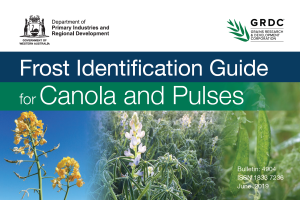Frost Identification Guide for Canola and Pulses
Frost Identification Guide for Canola and Pulses
Published: 1 Aug 2019
This guide assists with identification of frost damage and consideration of crop management decisions. Produced by the Department of Primary Industries and Regional Development, with co-investment from the Grains Research and Development Corporation it is wirebound and printed on water-resistant/heat-resistant paper.
This guide includes details on when to inspect crops, how to identify frost damage at the different stages of plant development, an overview of biotic and abiotic factors that may result in similar symptoms, and a list of weblinks to more information.
Frost damage reduces crop yield and grain quality. Early identification of symptoms allows timely crop salvage decisions to be made.
To identify frost damage
- Inspect canola and pulse crops between bud formation and pod-fill, if night air temperature falls below 2°C and there is likely to have been a frost.
- Check low-lying, light-coloured soil types and known frost-prone areas first. Then check other areas. Walk a machinery width into the paddock as crop on outside edge may have less damage.
- Frost damage can occur randomly, resulting in high variability within paddocks and even on individual plants.
- Monitor pod development and seed-fill following a frost event by tagging reference plants and checking these a few days later for signs of senescence (death) or continued development.
Further Information
- DPIRD Frost frequently asked questions brochure:
https://www.agric.wa.gov.au/frost/science-frost-and-frequently-asked-questions - Frost ID guide for cereals:
https://www.agric.wa.gov.au/frost/frostidentification-guide-cereals - DPIRD weather stations:
https://www.agric.wa.gov.au/weather-stationsand-radar - DPIRD Extreme Weather Events Tool:
https://agric.wa.gov.au/n/5766 - DPIRD MyCrop application:
https://www.agric.wa.gov.au/mycrop - Search ‘Frost’ on the DPIRD website:
www.agric.wa.gov.au - GRDC Frost management tip and tactics:
www.grdc.com.au/ManagingFrostRisk - Pulse Australia:
http://www.pulseaus.com.au
Download PDF
Region: National

